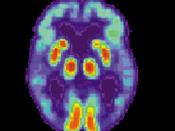Speech Comprehension in Alzheimer � PAGE �2�
Running Head: SPEECH COMPREHENSION IN ALZHEIMER
Speech Comprehension in Alzheimer
�
Speech Comprehension in Alzheimer
Within-group comparisons showed that the AD subjects performed better on the non-biological categories than on the biological categories, and better on the action verbs than on the abstract nouns or the biological categories. Accuracy for abstract nouns was not significantly different from biological nouns. The results from both tasks indicated, first, that knowledge of action-verbs was not more impaired than knowledge of objects in AD. Second, the convergence of results from tasks using different stimuli types (i.e. pictures and words) and different response type (i.e. naming versus forced choice judgements) calls into question explanations of category effects that are based primarily on visuopeceptual or lexical-phonological deficits. A modal semantic memory loss appears to be the major determinant of these category effects.
The general impairment in naming due to semantic impairment would be due to pathology of left temporooccipito-parietal junction.
Williamson et al. suggest that lexical retrieval is an important functional impairment in AD. The pattern of loss for action naming versus object naming might well reflect the different neural substrates for such lexical retrieval for nouns versus actions. Impaired lexical retrieval for objects would be due to lateral and inferior temporal pathology. Lexical retrieval for actions would involve, in contrast, premotor or pre-frontal cortical areas or both which are relatively spared in AD. The category effect with specific impairment of object naming would therefore be at the level of lexical retrieval and not linguistic semantics.
AD as a disease is distinguished by its anatomic variability and yet the category effect appears present (and in the same direction) in the large majority of individual cases as well in cases of frontotemporal dementia. This would seem to...


